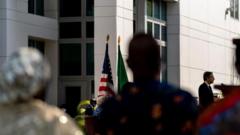Starting July 8, most non-immigrant visas for Nigerian citizens will be limited to three months and single-entry, reflecting a larger trend of diplomatic adjustments. Experts suggest the decision may be connected to Nigeria's shifting international alliances.
US Tightens Visa Regulations for Nigerian Applicants Amid Diplomatic Concerns

US Tightens Visa Regulations for Nigerian Applicants Amid Diplomatic Concerns
The US introduces new restrictions on Nigerian non-immigrant visas, altering the duration and entry conditions, while the Nigerian government remains silent on the changes.
The United States has implemented significant changes to its visa policies for Nigerian citizens, effective July 8, culminating in a reduction of the duration and conditions for entering the country. The US Department of State announced that nearly all non-immigrant and non-diplomatic visas issued to Nigerian travelers will now be valid for a single entry and a duration of only three months. This marks a drastic departure from the previous policies, which usually permitted multiple entries over a two-year period or longer.
This adjustment is described as part of a global reciprocity realignment, a concept also mirrored in Nigeria's own visa policies, which only allow single-entry visas valid for three months for visitors from the US. The Nigerian government has yet to issue an official response to these changes.
The State Department indicated that visa policies are "subject to ongoing review" and may be revised based on shifting diplomatic, security, and immigration standards. Recent statements from the US government highlighted its dedication to collaborating with Nigerian authorities to ensure compliance with crucial international benchmarks, such as the issuance of secure travel documents, the management of visa overstays, and the exchange of security or criminal data to maintain public safety.
Additionally, the US announced a new measure requiring scrutiny of social media accounts for all visa applicants, including those from Nigeria, to identify any potential hostility toward American citizens, culture, government, or foundational principles.
Nigerians constitute a significant demographic in the student visa application pool in the US. According to the 2024 Open Doors report on international education exchange, Nigeria ranks as the seventh largest source of international students to the US and holds the top position in Africa, with a reported 20,029 enrollees—a 13.5 percent increase over the previous year.
In response to the visa policy changes, a former aide to ex-president Muhammadu Buhari suggested that the US’s action reflects increasing discomfort with Nigeria's emerging global alignment, particularly following President Bola Tinubu's participation in the recent BRICS summit in Brazil. “This is not solely about reciprocity. Rather, it appears to reflect growing US discomfort with Nigeria's increasing global realignment,” he remarked on social media, igniting discussions on the implications of this development.






















